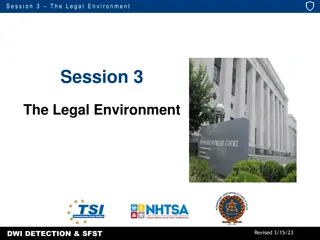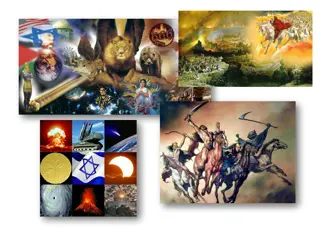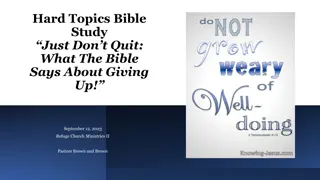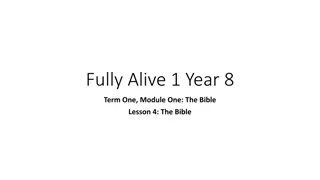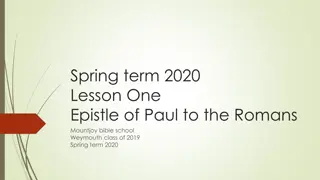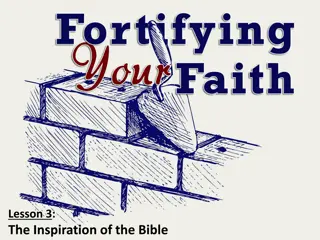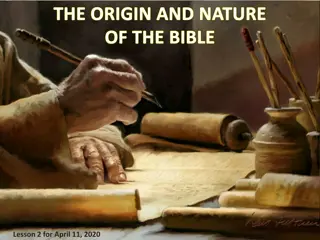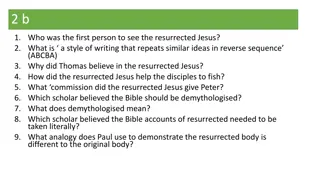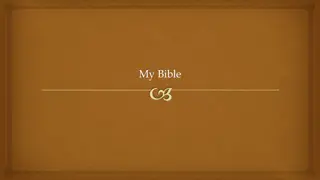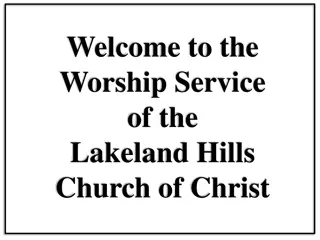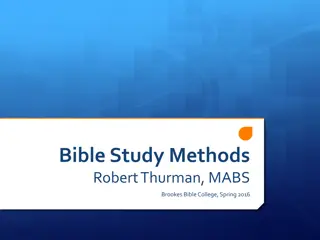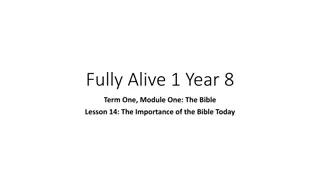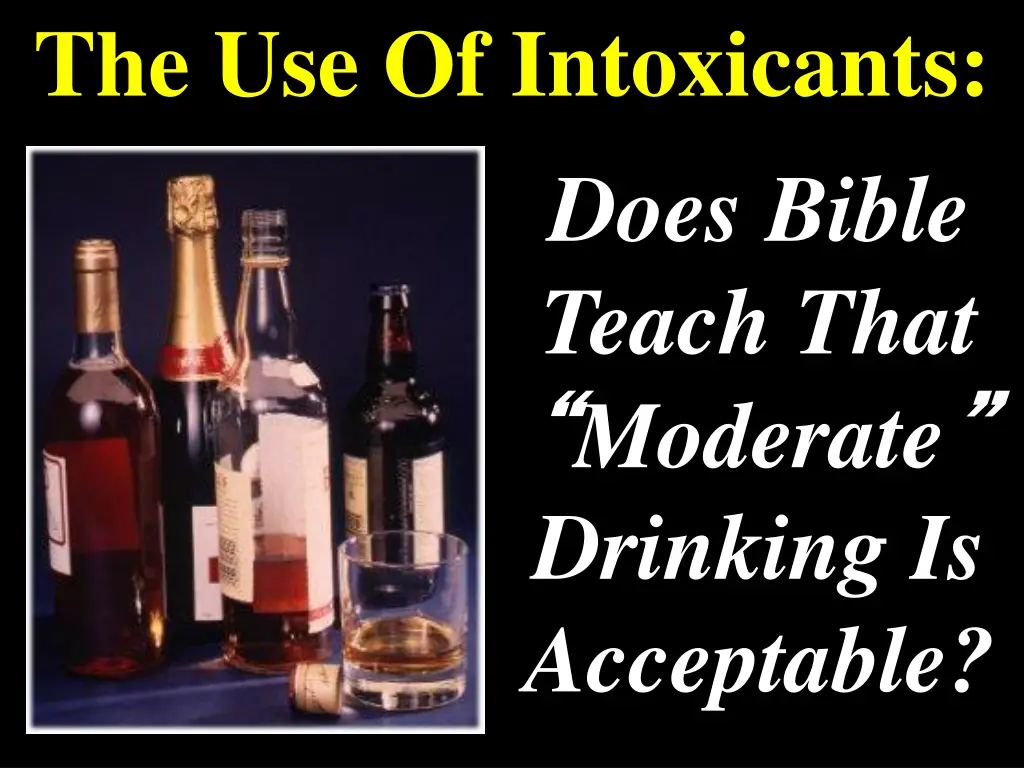
Bible Teachings on Alcohol Consumption and Intoxicants
Explore the Bible's perspective on moderate drinking and alcohol use, delving into verses that warn against the dangers of intoxication while considering the fine line between enjoying alcohol responsibly and crossing into drunkenness. Discover the distinctions made in the Old Testament regarding different types of beverages and their consumption, shedding light on the debate surrounding alcohol in modern society.
Download Presentation

Please find below an Image/Link to download the presentation.
The content on the website is provided AS IS for your information and personal use only. It may not be sold, licensed, or shared on other websites without obtaining consent from the author. If you encounter any issues during the download, it is possible that the publisher has removed the file from their server.
You are allowed to download the files provided on this website for personal or commercial use, subject to the condition that they are used lawfully. All files are the property of their respective owners.
The content on the website is provided AS IS for your information and personal use only. It may not be sold, licensed, or shared on other websites without obtaining consent from the author.
E N D
Presentation Transcript
The Use Of Intoxicants: Does Bible Teach That Moderate Drinking Is Acceptable?
Wisdom On Wine Do not look on the wine when it is red, when it sparkles in the cup, when it swirls around smoothly; at the last it bites like a serpent and stings like a viper (Prov. 23:31-32).
Can We Drink If Dont Get Drunk? Increasing number try to justify a moderate non- medicinal use of modern intoxicating beverages Does Bible approve such? (If so, what passage?) How do we understand passages warning against it? If only drunkenness is wrong, define drunk Some say may get a buzz, but that is not drunk In essence, same message as liquor industry Can we mirror the call of the world & yet claim to have higher moral standards than the world? Must look closer at Bible teaching
What Is A Drink Of Alcohol? Standard drink generally considered to be 12 oz. beer, 5 oz. wine, or 1.5 oz. of 80-proof distilled spirits. Each contains roughly the same amount of absolute alcohol -- approximately 0.5 ounce or 12 grams.
O.T. Condemns Use of Intoxicants Prov. 20:1 Folly & danger of use Prov. 23:29-35 Warning of its effect Prov. 31:4-7 General rule - don t drink Exceptional case of medicinal need noted Exception is not rule by which we reinterpret Isa. 5:11, 22 Woe upon user Hosea 4:11 Wine & harlotry enslave Lev. 10:9-10 Violates holiness of priest That you may distinguish between holy & unholy, and between unclean & clean N.T. parallels priests & Christians in holiness
O.T. Words for Wine TIROSH (used 38 times) Refers to what we call grape juice Isa. 65:8; Joel 2:24; Hos. 9:2; Prov. 3:10 Generally approved for consumption SHEKAR (used 22 times) Denoted & usually translated strong drink Alcohol raised by more sugar or non-grape Generally condemned for consumption Modern alcoholic beverages fall in this group YAYIN (some give as yanin - used 135 times) Generally used of wine with some alcohol About half of references clearly forbid use Approved for non-consumptive uses Jews of later period noted 3 distinct kinds
New Testament Teaching On Intoxicants
Condemns Drunkenness & Intoxicants Gal. 5:21 1 Cor. 6:10 Drunkards not inherit kingdom Rom. 13:12f Intoxication is work of darkness 1 Pet. 4:1-4 Included in desires of the Gentiles Later in this lesson, will examine distinct meaning of three words used in verse 3 Eph. 5:18 Condemn wine, wherein is riot Riot or excess said to be in the wine, not in the one drinking or the act of drunkenness Was there any other kind of wine in N.T. time? Drunkenness is work of the flesh
Wine (oinos) in N.T. Greek word for wine was oinos Word could refer to juice freshly squeezed from grape or fermented wine from the grape Whatever the origin, mixture of water & above was called wine (oinos) Plutarch (Symposiacs III, ix): We call a mixture wine (oinos) although the larger component parts is water. Everett Ferguson (Encyclopedia of Early Christianity, p. 939): The ordinary table beverage of Mediterranean world was a mixture of wine and water. Thus, modern wine is not same as N.T. wine
Ratios of Water to Wine Homer (Odyssey IX, 208f.): 20 to 1 Pliny (Nat. Hist. XIV, vi, 54): 8 to 1 Athenaeus (Learned Banquet): 3 to 1 Alexis (The Nurse): 4 to 1 Hesiod: 3 to 1 Ion (On Chios): 3 to 1 Talmud (Shabbath 77a): 3 to 1 Nichochares: 5 to 2 Clement (Instructor II, ii): It is best for the wine to be mixed with as much water as possible.
Best Case for Moderate Drinking Wine from grapes of Bible land would only yield about 8% alcohol at maximum That fermented wine was then cut: Ignores fact that wine could be kept without fermentation Assume wine reached full 8% alcohol content to start Normal cut was 3-6 water to 1 wine, but will assume 3/1 Yields drink of 2% alcohol by volume Typical beer is 8% Modern wine is 12-18% Distilled spirits & liquor around 40% on average 22 glasses of N.T. wine vs. 2 modern drinks to intoxicate If 6% cut 4/1, must drink 2.5 - 3 gallons an hour Most liberal case for N.T. time far from modern use!
1 Peter 4:1-4 1 Therefore, since Christ suffered for us in the flesh, arm yourselves also with the same mind, for he who has suffered in the flesh has ceased from sin,2that he no longer should live the rest of his time in the flesh for the lusts of men, but for the will of God.3For we have spent enough of our past lifetime in doing the will of the Gentiles when we walked in lewdness, lusts, drunkenness, revelries, drinking parties, and abominable idolatries.4In regard to these, they think it strange that you do not run with them in the same flood of dissipation, speaking evil of you . (NKJV)
1 Peter 4:1-4 1 Therefore, since Christ suffered for us in the flesh, arm yourselves also with the same mind, for he who has suffered in the flesh has ceased from sin,2that he no longer should live the rest of his time in the flesh for the lusts of men, but for the will of God.3For we have spent enough of our past lifetime in doing the will of the Gentiles when we walked in lewdness, lusts, drunkenness, revelries, drinking parties, and abominable idolatries.4In regard to these, they think it strange that you do not run with them in the same flood of dissipation, speaking evil of you . (NKJV)
1 Peter 4:1-4 1Forasmuch then as Christ suffered in the flesh, arm ye yourselves also with the same mind; for he that hath suffered in the flesh hath ceased from sin; 2that ye no longer should live the rest of your time in flesh to the lusts of men, but to the will of God. 3For the time past may suffice to have wrought the desire of the Gentiles, and to have walked in lasciviousness, lusts, winebibbings, revellings, carousings, and abominable idolatries: 4wherein they think strange that ye run not with them into the same excess of riot, speaking evil of you. (ASV) 1Forasmuch then as Christ hath suffered for us in the flesh, arm yourselves likewise with the same mind: for he that hath suffered in the flesh hath ceased from sin; 2That he no longer should live the rest of his time in the flesh to the lusts of men, but to the will of God. 3For the time past of our life may suffice us to have wrought the will of the Gentiles, when we walked in lasciviousness, lusts, excess of wine, revellings, banquetings, and abominable idolatries: 4Wherein they think it strange that ye run not with them to the same excess of riot, speaking evil of you. KJV
Words Used in 1 Peter 4:3 Two ways of life are addressed: Life of one with the mind of Christ Life of the flesh lived to lust of men List of sins includes those dealing with decreasing effects of alcohol: Drunkenness, winebibbings or excess of wine (oinophlugia) Revelries or revellings (komos) Drinking parties, carousings or banquetings (potos)
Drunkenness (oinophlugia) Also translated winebibbings & excess of wine Trench: marks a step in advance of methe More dissipated state of alcohol s effect described in Gal. 5:21 and Rom. 13:13 One in oinophlugia has lost all control Word used by Aristotle for state that harms body permanently (Eth. Nic. iii. 5. 15) Arrian used word to denote drunken debauch causing death of Alexander the Great (vii. 24, 25). Summary: drunk prone to passing out
Revelries (komos) Arndt & Gingrich: originally a festal procession in honor of Dionysus, then a joyous meal of banquet, in the NT... only in the bad sense excessive feasting (461). Thayer: a nocturnal and riotous procession of half- drunken and frolicsome fellows who after supper parade through the streets with torches and music in honor of Bacchus or some other deity, and sing and play before houses of their male and female friends; hence used generally, of feasts and drinking-parties that are protracted till late at night and indulge in revelry (367). Summary: those partying at Mardi Gras or bar scene
Drinking parties (potos) R.C. Trench (Syn. of the N.T.): "not of necessity excessive, but giving opportunity for excess" (225) Kistemaker (in Commentary on 1 Pet.): noted the same point (160) Primary definition by lexicographers for this word is simply "a drinking Other forms of word illustrate point: Poterion - cup Potidzo - I drink In context, a drinking of intoxicants not to excess Summary: modern moderate drinker Necessarily implies moderate drinking is sinful
Where Is Case To Justify Moderate Drinking? Condemnation of wine wherein is excess excludes drinking of modern intoxicants 1 Peter 4 condemns Drunkenness to loss of control Drinking that produces the buzz or party-going drinker who has a drink to get happy Drinking of an intoxicant to level of lesser effect than above [not drunk to loss of control or high with buzz ] What level of use would that condemn? Primary Question: Where is passage authorizing moderate use of intoxicants as good?
Efforts to Justify Practice 1 Tim. 5:23 For your stomach s sake Shows only that medicinal use is authorized Does not authorize any recreational or social use John 2:1-11 Water turned to wine Word wine is not equivalent to modern intoxicant Amount made was 106-160 gallons If intoxicating, Jesus provided for total drunkenness Jesus power made it best of most highly valued oinos Luke 7:33-34 John not drinking wine - Jesus did No truth necessarily present in charge made by critics Contrast of context with John the Baptist being Nazarite 1 Tim. 3:3 vs. 1 Tim. 3:8 or Titus 2:3 All deal with what one is not to do; no positive authority Don t get high on dope -- Authorize using a little?
Alcohol has many defenders, but no defense! --- Abraham Lincoln ---
REMEMBER: A Christian Has Higher Call as Example 1 Thess. 5:21-22 Prove all things; hold fast to good Col. 3:17 Do all in name [by authority] of the Lord 1 Cor. 10:31 Must do all to the glory of God 1 Pet. 2:11-15 Work to glorify God & silence evil Lk. 17:1-2 Not to be a stumbling-block to others 1 Cor. 10:32 Not to cause offense, but bring profit 1 Pet. 3:15-17 Live beyond reproach & shame evil Matt. 5:13-16 Let light shine so good works seen Eph. 5:11 No fellowship of evil works, but expose
2 Corinthians 6:14 - 7:1 14Do not be unequally yoked together with unbelievers. For what fellowship has righteousness with lawlessness? And what communion has light with darkness? 15And what accord has Christ with Belial? Or what part has a believer with an unbeliever?16And what agreement has the temple of God with idols? For you are the temple of the living God. As God has said: I will dwell in them and walk among them. I will be their God, and they shall be My people. 17 Therefore, Come out from among them and be separate, says the Lord. Do not touch what is unclean, and I will receive you. 18 I will be a Father to you, and you shall be My sons and daughters, says the LordAlmighty. 7:1Therefore, having these promises, beloved, let us cleanse ourselves from all filthiness of the flesh and spirit, perfecting holiness in the fear of God.

